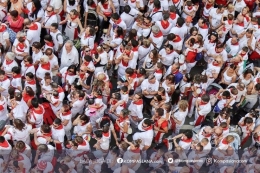Request a court decision, last conducted in 1986, where Andi Vonny Gani as the applicant. There is a jurisprudence of Supreme Court decision which is Supreme Court Decision No. 1400K/Pdt/1986.[2] This decision stated that, Civil Registry Office (KCS) at that time allowed to conducting an inter-religion marriage. This case started when Andi Vonny Gani (women/Christian) as the applicant, want to married with Andrianus Petrus Hendrik Nelwan (men/Christian). In their consideration, Supreme Court stated that by the filling of petition for conduct the marriage to the chief of Civil Registry Office (KCS), should be interpreted that the applicant intends to conduct a marriage is not as a Islamic marriage. So, in that condition, Civil Registry Office, as the only institution that has the authority to conduct a marriage for non-islamic marriage, should approve the applicant. So, there is a possibility.
Interfaith Marriage Registration (Chatolic Institution-St. Antonius Church Case)
Officials of the Population and Civil Registry Office said that the office only accepts and records the testimony from religious institutions, in Sak Liung and Friska’s case, the church. According to Martinus Agus Hutoro, the chief of Marriage and Divorce Services section and Joko Setiadi, the chief of Development and Data System Maintenance section (both from the Civil Registry Office), the office has no problem if the groom and the bride have different religious backgrounds as written in their identity cards as long as there is a testimony from a religious institution that it has officiated their wedding ceremony, because the purpose of the civil registry office is just register marriage that has been legitimate or legal by the religious authority. Based on the couple’s story, the religious institution plays the important role in making an inter-religion marriage possible.[3]







